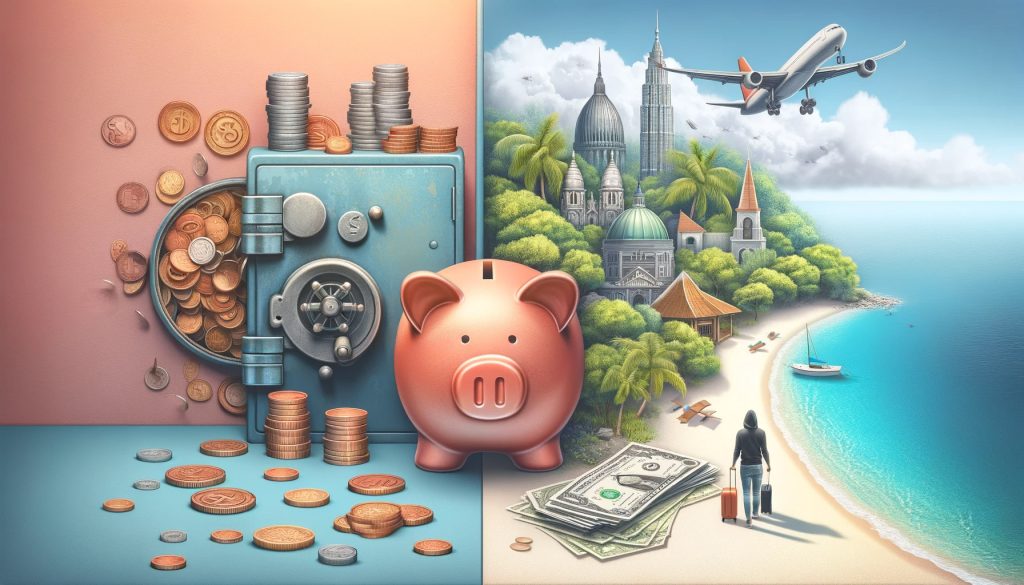In the labyrinth of life choices, the dichotomy between frugality and wanderlust presents a perplexing problem. The intricate dance between saving money and embarking on a journey unfurls a tapestry of complexities, replete with advantages and pitfalls. The decision, a delicate interplay of financial prudence and experiential yearning, becomes an enigma hinged upon individual preferences. This article shrouded in the intricacies of personal finance and the allure of exploration, assumes the mantle of a guide through this bewildering terrain. It delves into the complexities of the advantages and disadvantages intrinsic to both options, offering a compass to navigate the perplexities and emerge with an informed decision that harmonizes individual preferences with the ever-evolving landscape of financial and experiential aspirations.
- The Advantages of Saving Money
In the intricate tapestry of financial planning, the pivotal thread of saving money emerges as a cornerstone with multifaceted significance. Beyond the immediate gratification of meeting short-term needs, saving imbues one’s financial landscape with resilience, creating a cushion to weather the storms of unforeseen emergencies. Moreover, it becomes an instrumental tool in pursuing long-term aspirations, offering a tangible pathway toward achieving lofty goals. The profound implications extend beyond monetary metrics; saving money is a bulwark against the insidious encroachment of debt, alleviating the accompanying stressors often accompanying financial strain. The intangible dividends of financial prudence manifest in a profound sense of security and tranquility, underscoring the intrinsic value of a well-nurtured savings habit. In the grand orchestration of economic well-being, saving money resonates as a harmonious note, orchestrating a symphony of stability and peace of mind.
- The Benefits of Going on a Trip
Embarking on the odyssey of travel unfolds as a transformative venture, an alchemical process that traverses geographical landscapes and transmutes the essence of one’s being. The kaleidoscopic tapestry of new cultures, faces, and perspectives, intricately woven through the journey, extends the contours of personal horizons. Beyond the mere act of traversing physical distances, travel assumes the guise of a refreshing elixir. This panacea alleviates stress and monotony, breathing vitality into the weary soul. It transcends the mundane routines of daily existence, sculpting enduring memories that linger as souvenirs of temporal escapades. Yet, the lessons from travel transcend the ephemeral, imparting invaluable life skills such as budgeting, problem-solving, and communication. In this symphony of experiences, the journey becomes a maestro orchestrating geographical exploration and an immersive metamorphosis of the self.
- How to Save Money for a Trip
Embarking on the decision to undertake a journey necessitates a meticulous choreography of financial planning, an orchestration where prudence and aspiration converge. Initiate this odyssey by crafting a comprehensive budget, a roadmap delineating the economic contours of your impending adventure. Set a savings goal, a beacon guiding your fiscal trajectory toward realizing travel aspirations. Delve into the minutiae of daily expenditures, identifying avenues to curtail costs, whether embracing a culinary vacation at home or severing ties with superfluous subscriptions. Explore the realm of entrepreneurial endeavor by contemplating a side hustle or parting ways with possessions that no longer serve you, infusing your savings with newfound vigor. Elevate the gravitas of your travel aspirations by establishing a dedicated savings sanctuary, a bespoke account tailored to your journey. Facilitate the journey toward your savings summit by automating this financial ascent, ensuring that each contribution propels you closer to the zenith of your travel ambition.

- Planning a Trip on a Budget
Embarking on a budget-conscious travel escapade need not entail the forfeiture of joy or experiential richness; it beckons a strategic exploration of cost-effective alternatives. Initiate this fiscal journey by delving into the realm of research, unearthing destinations that offer a harmonious blend of affordability and enchantment. Harness the power of deals by meticulously scouting for economical flights and accommodations, leveraging the treasure trove of discounts that the travel sphere often conceals. Temporal finesse becomes your ally; traverse during the off-season or seize the spontaneity of last-minute deals to maximize your budget’s efficacy. Enrich your itinerary with free or low-cost pursuits—whether the rhythm of hiking trails or the cultural immersion offered by local museums—providing a tapestry of experiences without the burden of high costs. Transform your culinary exploration into an odyssey of affordability by indulging in local street fare, a gastronomic journey that marries authenticity with financial prudence. Forge a communal expedition by traveling with a group, harmonizing shared experiences while distributing costs, an economic synergy that elevates the collective enjoyment of your budget-conscious sojourn.
- Making the Right Choice
In the intricate calculus of choosing between the accumulation of financial reserves and the allure of embarking on a journey lies a profoundly personal deliberation contingent upon one’s goals and priorities. Contemplate your present economic landscape, evaluating imminent expenses or looming debts that might sway the scales. Ponder upon the nuanced benefits of both options, meticulously weighing the pros and cons to discern the trajectory that aligns with your aspirations. Should the compass point toward the expeditionary allure of a trip, ensure a judicious orchestration of planning and saving, thus optimizing the immersive quality of your experiential odyssey. This decision, akin to a bespoke compass guiding life’s trajectory, underscores the importance of introspection and strategic alignment with one’s aspirations and fiscal circumstances.
Does it depend on a person’s mood and personality?
The nuanced decision-making process between saving money or embarking on a journey is inherently entwined with one’s character, values, and preferences. The kaleidoscope of personal traits and beliefs molds the contours of this choice. Individuals may prioritize financial security, seeking comfort in embracing a robust emergency fund. In contrast, others, driven by the spirit of adventure, may be willing to traverse the terrain of financial risk. The fabric of personal fulfillment finds its expression in diverse forms; some derive joy from immersing themselves in novel landscapes and cultures, while others glean satisfaction from the steady construction of long-term financial stability. This profoundly personal calculus, rooted in individual circumstances and aspirations, underscores the bespoke nature of the decision-making process, navigating the delicate balance between economic pragmatism and the beckoning allure of experiential exploration.
Which one do psychologists recommend?
In the intricate realm of psychological counsel, a nuanced orchestration emerges, advocating for a symphony of financial prudence and experiential indulgence. Recognizing the complicated dance between fiscal responsibility and pursuing meaningful experiences, psychologists invariably steer individuals toward a harmonious equilibrium. The labyrinthine research tapestry reveals a compelling correlation: those favoring experiences over material possessions tend to bask in heightened happiness and life satisfaction. The alchemy of experiential immersion, fostering personal growth, social connectivity, and a tapestry of positive emotions, becomes a veritable elixir for overall well-being. Yet, in this perplexing dynamic, the refrain of financial security echoes with significance, acting as a stabilizing force to assuage stress and cultivate peace of mind.
The crux of this psychological counsel pivots on the delicate art of finding balance—a bespoke equilibrium forged by individual goals and priorities. By sculpting realistic savings goals and orchestrating budgetary allocations for indulging in enjoyable experiences, individuals navigate a labyrinth that begets a life both well-rounded and satisfying. This sage counsel, grounded in the tenets of psychology and financial pragmatism, becomes a compass guiding the perplexing journey toward a life that seamlessly integrates the pillars of financial security and the richness of meaningful experiences.
What is the planning method for each one?
In the enigmatic realms of financial prudence and experiential voyages, distinct methodologies unfold, demanding meticulous choreography for coveted outcomes. Navigate the labyrinth of saving money or embarking on a journey with structured planning methods, where fiscal acumen and wanderlust converge in a delicate balance of discipline and aspiration:
Planning method for saving money:
- Set financial goals: In the intricate symphony of financial planning, the inaugural note sets distinct goals. This orchestration involves the discernment of both short-term urgencies and long-term aspirations, spanning the spectrum from fortifying an emergency fund to extinguishing debt or seeding the soil for a home down payment.
- Create a budget: Embark on the meticulous choreography of fiscal stewardship by harmonizing the melody of income and expenses. Craft a nuanced budget, a realistic ledger that sustains your lifestyle and orchestrates a harmonious cadence, allowing for consistent monthly savings.
- Reduce expenses:Embark on a fiscal refinement expedition by scrutinizing and curating superfluous expenditures. Prune away unnecessary indulgences like dining out, subscription services, or impromptu shopping, sculpting a leaner financial tableau.
- Automate savings: : Elevate the artistry of savings by instilling a habitual rhythm through the orchestration of automatic transfers to a dedicated account. Transform financial discipline into a seamless cadence, where saving money becomes an ingrained and orchestrated habit.
- Review and adjust: Navigate the ever-evolving financial symphony with astuteness by regularly reviewing your budget. Harmonize your fiscal composition by agilely adjusting savings goals, ensuring a dynamic resonance that keeps you on the intricate journey toward financial well-being.
Planning method for going on a trip:
- Choose a destination: Embark on the enigmatic voyage of destination selection by immersing yourself in comprehensive research. Weigh the intricate nuances of cost, cultural resonance, diverse activities, and the erratic climate, sculpting a travel tapestry that aligns seamlessly with your aspirations.
- Create a travel budget:In the financial symphony of travel aspirations, determine the financial allocation for your expedition. Craft a comprehensive budget, intricately detailing allowances for transportation, accommodations, gastronomic indulgences, and the kaleidoscope of activities, sculpting a fiscal composition that harmonizes seamlessly with your wanderlust.
- Plan your itinerary: : In orchestrating your travel odyssey, craft an intricate itinerary detailing the symphony of transportation, accommodations, and activities. Anticipate the capricious cadence of unforeseen changes by considering alternate options, ensuring your itinerary is a resilient composition poised to navigate unexpected challenges gracefully.
- Prepare for emergencies: Elevate the choreography of travel preparedness by assembling a meticulous first aid kit, duplicating crucial documents, and formulating a strategic plan for emergencies, whether it be illness or the unpredictable specter of natural disasters. Fortify your expedition with a resilience that transcends the ordinary, ensuring a safeguarded journey through the unforeseen twists of travel.
In the intricate dance of financial stewardship and experiential exploration, the pivotal linchpin is formulating a strategic plan infused with realistic goals. This structured approach becomes the compass guiding individuals toward realizing desired outcomes, amplifying the prospects of success and concurrently diminishing the burdens of stress and uncertainty inherent in both realms.
Conclusion:
In the intricate tapestry of life choices, the decision between saving money and embarking on a journey unfurls as a nuanced exploration of advantages and drawbacks. The compass guiding this decision is your personal goals and priorities, intricately interwoven with the fabric of your unique situation. Whether the path leads to the fortification of financial reserves for the future or the immersive creation of enduring memories through travel, the crux lies in meticulous planning and budgeting, ensuring the orchestration of a journey or savings trajectory aligned with your aspirations.
FAQ
Should I prioritize saving money or going on a trip?
In the intricate realm of personal finance and experiential aspirations, the pendulum swings between saving money and embarking on journeys, each potentially contributing to overall well-being. The paramount imperative lies in the delicate calibration of a bespoke balance that resonates with your individual goals and priorities, navigating the perplexities of financial and experiential landscapes.
How can I save money for a trip?
Embark on the fiscal pilgrimage of saving for a journey by sculpting a budget, pruning expenses, and infusing discipline through automated savings. Navigate the labyrinth of frugality by scouring the landscapes for travel deals and discounts, enriching your savings journey with prudent financial acumen.
Is it worth going into debt to go on a trip?
In the intricate dance of financial decisions, venturing into debt for discretionary expenses like travel is generally cautioned against. Prioritizing financial security and eschewing unnecessary debt becomes imperative, fostering a disciplined approach to fiscal choices in the labyrinth of discretionary spending.


1 Comment